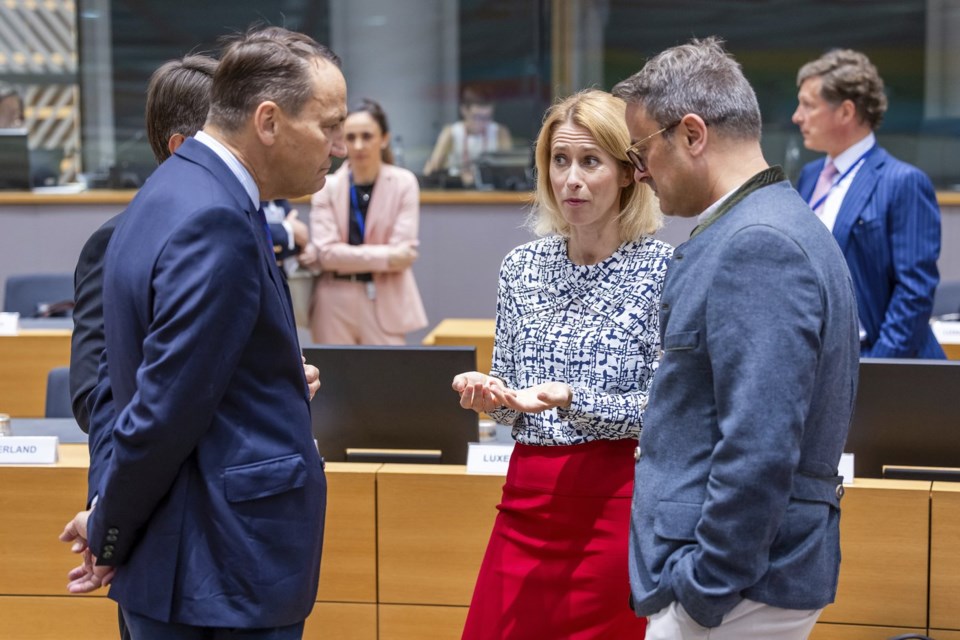BRUSSELS (AP) — Ukraine and its European backers on Monday sought talks with U.S. President Donald Trump in an effort to protect their security interests ahead of his summit with Russian President Vladimir Putin later this week.
Ukrainian President Volodymyr Zelenskyy has so far been excluded from the U.S.-Russia summit in Alaska on Friday, and the Europeans are unlikely to be invited. All are wary that Putin and Trump might agree, without Ukraine's participation, to land swaps of Ukraine’s territory or other terms that might favor Russia.
German Chancellor Friedrich Merz organized a series of meetings for Wednesday. He invited Trump, U.S. Vice President JD Vance, Zelenskyy, NATO's chief and several European leaders to attend. The chancellery said the talks would focus on “further options for action to put pressure on Russia” as well as “preparations for possible peace negotiations and related issues of territorial claims and security.”
The European Commission confirmed that President Ursula von der Leyen will take part “in the calls organized by Chancellor Merz.” The leaders of Britain, Finland, France, Italy and Poland are also set to join the “various discussion groups,” the chancellery said.
Ukraine and its backers in Europe insist that Trump and Putin cannot decide on land swaps behind their backs at the summit, but the Europeans concede that Moscow is unlikely to give up control of Ukrainian land it holds.
“There’ll be some land swapping going on. I know that through Russia and through conversations with everybody. To the good, for the good of Ukraine. Good stuff, not bad stuff. Also, some bad stuff for both,” Trump told reporters on Monday.
He did not confirm whether he would take part in the talks convened by Merz, but said: “I’m going to get everybody’s ideas” before meeting with Putin.
Nothing about Ukraine without Ukraine
Concerns have mounted in Europe that Kyiv may be pressed to give up land or accept other curbs on its sovereignty. Ukraine and its European allies reject the notion that Putin should lay claim to any territory even before agreeing to a ceasefire. They want a ceasefire first.
In Europe, a “coalition of the willing” has been formed by countries ready to deploy troops to Ukraine to police any future peace agreement with Russia. French President Emmanuel Macron, U.K. Prime Minister Keir Starmer and Merz are organizing a coalition meeting, also on Wednesday, to coordinate.
Poland is also part of that coalition. Prime Minister Donald Tusk said “it must be obvious to Poland and our European partners — and I hope to all of NATO — that state borders cannot be changed by force.” Any land swaps or peace terms “must be agreed upon with Ukraine’s participation,” he said, according to Polish news agency PAP.
Still, it’s hard to ignore the reality on the ground.
Russia in 2022 illegally annexed the Donetsk and Luhansk regions in Ukraine’s east, and Kherson and Zaporizhzhia in the south, even though it doesn’t fully control them. It also occupies the Crimean Peninsula, which it seized in 2014.
On the 1,000-kilometer (620-mile) front line, Russia’s bigger army has made slow but costly progress with its summer offensive. The relentless pounding of urban areas has killed more than 12,000 Ukrainian civilians, according to U.N. estimates.
Acknowledging battlefield realities
“In the end, the issue of the fact that the Russians are controlling at this moment, factually, a part of Ukraine has to be on the table" in any peace talks after the Alaska summit, NATO Secretary General Mark Rutte said on CBS on Sunday.
Rutte said Ukraine’s Western backers “can never accept that in a legal sense,” but he suggested that they might tacitly acknowledge Russian control.
He compared it to the way that the U.S. hosted the diplomatic missions of Estonia, Latvia and Lithuania from 1940 to 1991, “acknowledging that the Soviet Union was controlling those territories, but never accepting (it) in a legal sense.”
Giving up any territory, especially without a ceasefire agreement first, would be almost impossible for Zelenskyy to sell at home after thousands of troops have died defending their land.
Ultimately, Putin is seen by some analysts as being not so much interested in land itself, but rather in a more “Russia-friendly” Ukraine with a malleable government unlikely to try to join NATO, just as pro-Russian breakaway regions in Georgia have complicated that country's quest to become a member.
The way ahead
Zelenskyy insists that a halt to fighting on the front line should be the starting point for negotiations, and the Europeans back him. They say that any future land swaps should be for Ukraine to decide and not be a precondition for a ceasefire.
Claims on land could also be part of negotiations on the kind of security guarantees that Ukraine might receive to ensure another war does not break out.
The Europeans believe Kyiv’s best defense is strong armed forces to deter Russia from striking again. They insist there should be no restrictions on the size of Ukraine’s army and the equipment, arms and ammunition it can possess or sell.
Beyond that, they say Ukraine should not be constrained in its choice of joining the EU or being forced to become a neutral country.
The Trump administration has already taken Ukraine's membership of NATO off the table for the foreseeable future.
For the Europeans, maintaining unity is also key. After chairing a meeting of foreign ministers on Monday, EU foreign policy chief Kaja Kallas said they had agreed to “work on more sanctions against Russia, more military support for Ukraine and more support for Ukraine’s budgetary needs."
“Transatlantic unity, support to Ukraine and pressure on Russia is how we will end this war and prevent future Russian aggression in Europe,” Kallas posted on social media.
___
Grieshaber reported from Berlin. Associated Press writers Dasha Litvinova, Jamey Keaten in Geneva and Sylvie Corbet in Paris contributed.
Lorne Cook And Kirsten Grieshaber, The Associated Press




